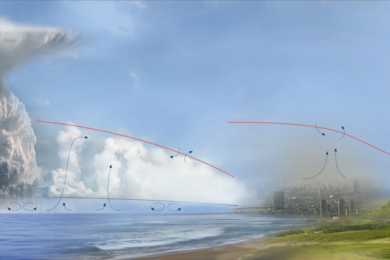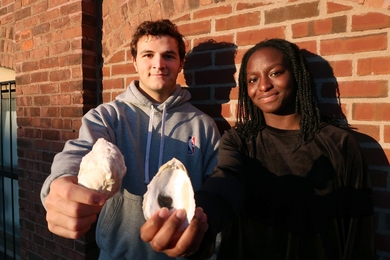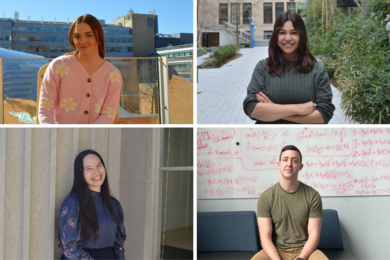Don't spend all your time doing problem sets, the president of the Undergraduate Association told members of the Class of 2006 at Monday's convocation.
Determine who you are, said Josiah Seale, a senior majoring in political science. "And whoever you are, be that person with excellence."
Four years at MIT, he said, "is a time for you to develop your identity apart from being 'the smart one.' Determine your priorities. You can sacrifice a lot for your grades--family relationships, friends, health, your sanity.
"You are all in the 99.9th percentile, so you're all likely to be average here. I discovered I actually had to work hard. And very often I still got a B.
"My grades are not my first priority in my life and they're not my second priority. My spirituality, my family relationships are more important," said Seale, who encouraged the students to look around and get to know Boston.
"I took a 10-minute walk around every T stop in Boston," he said. "I had no idea there was a beach on the Blue Line."
President Charles M. Vest encouraged freshmen to design their own dreams in the collaborative research environment of MIT. He then introduced an exemplary practitioner of that sort of inspired, directed research: Professor Robert Langer, who wowed the students with innnovative products from his research portfolio.
"At MIT we are all learners and teachers ... Believe me, the faculty can and do learn from students here," said Vest. "This is because we are on a voyage of discovery together. That's what it means to be in a research university.
"The key is to take a look around you ... and pick up on something that really grabs your interest, that engages your curiosity and that charges your imagination."
In his introduction of Langer, the Germeshausen Professor of Chemical and Biomedical Engineering and winner of the Draper Prize for engineering, Vest described Langer's "diverse, innovative, audacious" approach to research.
"At the time, there was no way to get large molecules, which showed promise for fighting cancer and other diseases, through a plastic implant in a controlled manner. Bob ignored the prevailing views that this couldn't be done, and discovered engineering principles that would make this possible.
"Bob Langer is not only a superlative researcher but also a dedicated and effective teacher. Every university I visit brags that they have a faculty member who was trained in Bob Langer's lab. But here at MIT, we have Bob Langer himself," said Vest.
Langer described some of his lab's work, including the "pharmacy on a chip," which can deliver precise amounts of drugs at specific intervals; tissue engineering in the form of a human nose and as new skin for a burn victim, both grown from human cells placed on a scaffold; and new research that uses neuronal stem cells placed on polymer scaffolds to mimick the spine. Down the road, the latter might be used to help people with spine injuries, he said.
"Follow your dreams," Langer exhorted. "MIT is a wonderful place to follow them. I hope you have a great four years here."
Dean of Undergraduate Education Robert Redwine encouraged the freshmen to get help when they need it. "If one form of help doesn't work for you, try another. MIT is a very collaborative place," said Redwine, who encouraged students to collaborate rather than compete.
"Go out of your way to get to know the faculty," he said. "Invite them to lunch or dinner. You might even find that they'll pay for it."
A version of this article appeared in MIT Tech Talk on August 28, 2002.






